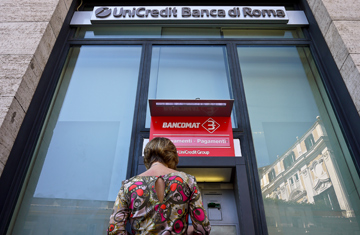
A customer makes an operation at an automatic teller machine of a Unicredit Bank branch in Rome on September 20, 2011
There's nothing wrong with the Italian economy that can't be fixed. That was the judgment delivered by the ratings agency Standard and Poor's on Tuesday, even as it cut the country's credit rating from A+ to A and slapped it with a negative outlook. The problem, S&P explained in its report, is that it's unlikely the country's politicians have what it takes to provide the overhaul the economy needs.
Italian Prime Minister Silvio Berlusconi was quick to dismiss the downgrade as "influenced by political considerations." And in at least one sense of the phrase, he was right. The ratings agency described Italy as having "a diversified economy and few external imbalances," one in which "both household and corporate balance sheets" were "relatively strong." The country's heavy government debt should be manageable, if not for an entrenched ecosystem of competing economic interests that have become so entangled they not only strangle the country's growth, they cut off any efforts at reform. "Even under pressure, Italian political institutions, incumbent monopolies, public-sector workers, and public- and private-sector unions impede the government's ability to respond decisively to challenging economic conditions," the report concluded. "With elections due in 2013, and the government's parliamentary position tenuous, it is unclear what can be done to break the deadlock between these political institutions and the government."
As in the U.S. in August, when S&P announced a drop in Washington's credit worthiness, the major consideration in Italy's downgrade wasn't economic, but political. In the last decade, the per-capita income of Italians has stayed steady, with economic growth at least one percentage point lower than that of any other country in the euro zone. Deficiencies in the education system, particularly in secondary school and university, and an ossified job market have caused millions of young people to almost drop out of the economy altogether. Roughly one out of every four Italians between the ages of 15 and 29 are neither employed nor in educational training. "These are people who we've really lost," says Tito Boeri, an economist at Milan's Bocconi University. "This is a serious problem of wastage of resources."
Those who do manage to find work enter a labor market in which most new jobs are so unstable that there's little incentive for employers or workers to invest in skills that would move the economy forward. Tax benefits for stay-at-home parents and lack of investment in daycare or other assistance for young families prevent many Italian women from entering the workplace. Powerful national unions prevent companies from paying according to local conditions; weak regulators allow monopolies nearly free rein; and a system of professional guilds limits mobility and entrenches privilege.
It's not that Italians don't know what needs to be fixed. Solutions to the problems are rehashed every time two economists sit down for coffee. But so furiously do the lobbies defend their interests that in Italy it's easier to raise taxes — as the Berlusconi government recently did in a $70-billion austerity package — than to actually tackle the underlying issues. "When you raise taxes, you distribute the burden," says Roberto D'Alimonte, professor of political science at Rome's LUISS University. "But when you reform, you're cutting at special groups, definite groups, and politically it's very costly." As examples of the government's inability to deliver, S&P cited a union-led opposition to privatization that scuttled a takeover of Alitalia by Air France and — more recently — an effort to liberalize access to professions such as lawyers and notaries, which was dropped in July after members of Berlusconi's coalition threatened to bring down the government in protest.
Berlusconi's government is hardly the first to fail to pass significant reforms, says D'Alimonte. But its ability to deliver has never been in more serious doubt. "They can't make hard decisions without hard, external pressure," he says. "This is a limit of the Italian political class in general, and especially within the present government." The ruling majority is patched together from a broad coalition of competing interests with deep stakes in the status quo, united around a charismatic billionaire prime minister. And while Berlusconi has been able to manage defections through a mixture of grit and political balancing, a mounting series of sex and corruption scandals has left him politically weakened, not to mention nearly knee-capped by the convulsing economy. Where a more powerful government might have been able to use the panic over Italy's debt to push through the reforms the economy needs, in Berlusconi's case the crisis was wasted.
Thus, even as talks in Greece seem to be moving towards an agreement that could allow it to be bailed out in exchanged for deep cost-cutting measures, Italy remains the domino that can't be allowed to fall, but nonetheless continues to lean dangerously. With one of the largest economies in Europe, it has been judged as too big to bail out. And yet, with S&P saying that it could downgrade the country once again and other agencies — most notably Moody's — currently examining its books, it's becoming increasingly clear that if Italy does begin to topple, it may be unable to save itself.
